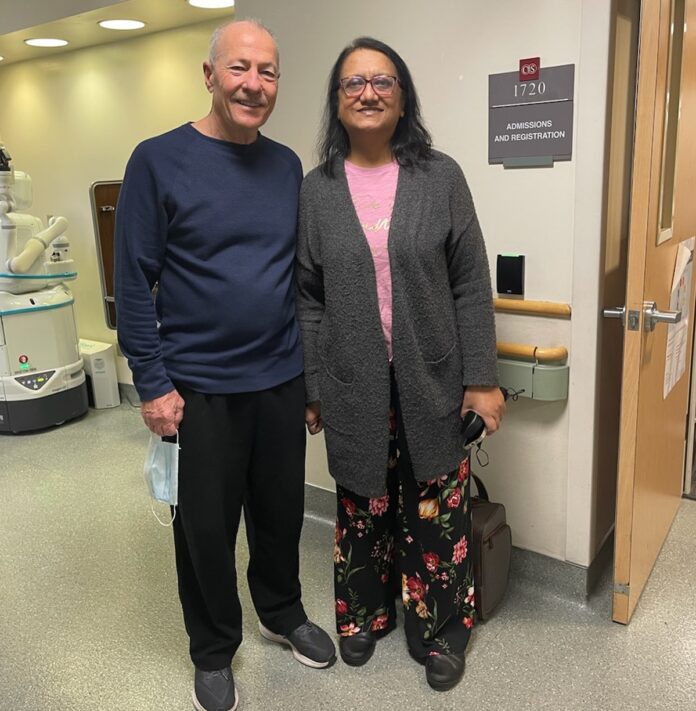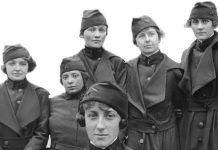
Handling criminal cases at the El Cajon Courthouse, Dan Lamborn is a judge of the Superior Court of San Diego County. The East County resident has held his position since 2013, and prior to his first term he worked with the San Diego District Attorney’s Office as chief deputy district attorney. But the honorable judge is on medical hiatus at the moment. On Friday, Jan. 6, Lamborn donated his kidney during a live transplant at Cedar-Sanai hospital in Los Angeles.
But his story of donating a kidney goes back a few years. He first tested to donate his kidney to a judge friend of his, but after months of testing, found out that he was not a match.
“But I was able to explore some other options being on the list,” he said. “One night I was talking to a friend, Simon Gounder, and we were just talking. We have done a lot of work together. We worked in groups to provide clean drinking water in villages in Fiji. We have been on the board of Give Clean Water, based out of San Diego, which seeks to find clean filtered water in many areas of the world where they have problems with diarrhea and dysentery. We worked together on that, so we became very close friends.”
Lamborn started working with Give Clean Water about 12 years ago when a group of people from his church, Newbreak Church, saw a need in countries that had sources of water, but were often sources infected with bacteria, amoebas, and parasites.
“They had water, but it was dirty water. We worked with a company called Sawyer which does a lot of work with water filters and developed a partnership with Give Clean Water,” he said. “They said if we could go to the villages and teach the people how to use the filters, they would provide them. We have gone to the interior villages in Fiji, Mexico, Nicaragua, Liberia, and have provided these water filters, where we go to every hut or house and teach them how to use this filter. It is a simple filter. We teach them how to use this, how to clean it, and they last for years and years and provide a family with all the water they need. We go back to make sure that they are doing it right and it is working because we want to make sure that it is a sustainable that villages really benefit from.”
Lamborn said while talking with Gounder, they were talking about how their families were doing and he told him that his wife Angie was going through another year of dialysis and that it was a struggle because her kidneys were not functioning. Although he had worked with him for years, he had never met his wife.
“I said, ‘This must be the hand of God, because I just got tested for a friend of mine, a judge, and I was not a match. How about I keep testing and see if I am a match for Angie,’” he said. “He said that would be terrific, so for the last year through 2022, we went through a variety of tests to make sure that you are a good match for the recipient. We did all the tests. Talked to all the doctors and social workers, and at the end it was very good news. I was a match for her.”
Lamborn said when he met Angie Gounder, he found her to be an incredible compassionate person.
“But she was restricted because she had to go through dialysis. For anyone who has been through that it is a very taxing experience. You go in three days a week, four hours at a time to get your blood processed. It is very taxing, very tiring, and you cannot do that forever. God’s hand was in this,” he said.
“This last Friday, we went up Cedars-Sinai hospital and went through the whole process,” he continued. “The surgery where they removed my left kidney for me. She was in an adjoining room. They prepared the kidney and took it over to her immediately and placed it inside her. After all that was done, the doctor said the kidney was working great. They said she was processing everything that she needed to, and that the kidney was working in a terrific fashion. It was awesome that I was able to do that.”
Dan Lamborn’s wife, Denise Lamborn said the nephrologist said physically, people like Angie live five years or less.
“She had already completed three years of dialysis,” she said. “Also, typically after you receive a kidney that you continue on dialysis for a short time. However, this kidney is working so well that the doctors came in and told her that she was no longer sick and she will not need dialysis ever again. I think that is pretty miraculous. Live donors are very rare. In fact, the transplant center, the nursing staff that were in our recovery room had never seen a live donor before.”
Denise Lamborn said she was very supportive of her husband’s decision.
“A core value of ours is to give back, and we are very privileged people and very blessed people. We are happy to give anything we can. Dan is a healthy person and we really felt it was God’s will for him to do that. We went through the typical nervousness of surgeries but felt it was the right thing to do and felt really good about it,” she said.
Dan Lamborn said that giving a kidney is a big deal, but he feels that his recovery is going extremely well, and it was worth it, especially helping change the lives of good friends.
“Overall, I am recovering quickly. It is a slow process. It takes a couple of months to get back to normal. I feel like I am in terrific shape now. The doctors at Cedars-Sanai were terrific and did an excellent job in doing the kidney transplant. But when you have seen a life changed by this, you wonder why more people do not do this. They are saving lives. I am surprised that it is not more common. I think it is because people do not know enough about it.”













